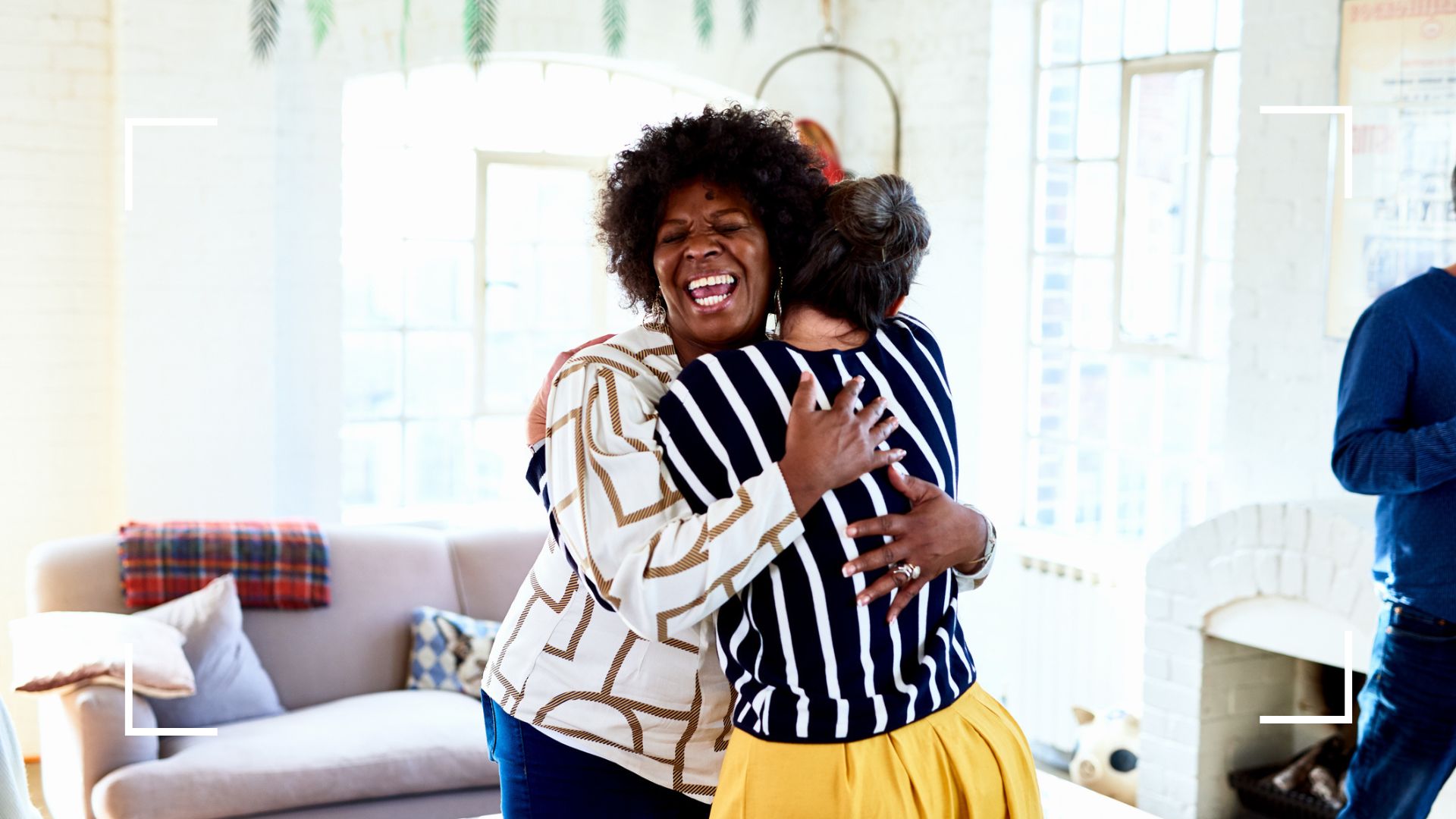How to be happier: 24 simple habits to help you feel more positive
Knowing how to be happier is all about the small uplifting habits in your routine. Here, several psychologists and other specialists reveal the important ones to include


Can you really learn how to be happier? The experts think so. While there could be many reasons behind any potential unhappiness, there are some simple habits you can include in your daily routine to try and keep up those positive feelings all week long.
Of course, it's only natural to feel unhappy sometimes. It wouldn't be realistic to expect to feel like you were living on cloud nine the whole time. Whether it's something going wrong at work, issues at home, stress, or personal emotions like feelings of low self-esteem and low confidence, we all have down days. Alternatively, you might already feel happy and content with life but you may be wondering if you could be even happier.
Either way, learning how to be happier at any age is entirely possible. Small habits and changes to your routine can make all the difference to understanding happiness and helping you be more confident with all parts of life, from how to be happy in a relationship, and with friends to being happy by yourself. Here, woman&home speaks to a range of experts, from five-board certified life coaches and psychologists to nutritionists and doctors specialising in integrative medicine, to reveal what you need to know.
How to be happier
1. Engage in self-reflection
The key to understanding unhappy emotions is self-reflection, says Dr Rina Bajaj, counselling psychologist and author of The Magic In Me. "Take some time to reflect on the reasons behind your unhappiness. Are there specific situations, relationships, or aspects of your life that are contributing to these feelings? Identifying the root causes can help you develop a clearer understanding of what needs to change and where you may be able to process and take more control over your emotions," she says.
"There may be times when it’s also important to reach out for support. Talking about your feelings with someone you trust can provide emotional relief and insights."
2. Eat for a better mood
As registered nutritionist Jenna Hope explains, "Our diets play a vital role in supporting our mood as nutrients are essential for the production of the happy hormone serotonin. For example, research [from King George's Medical University] has shown low levels of Vitamin D have been associated with an increased risk of low mood. Carbohydrates are pivotal for encouraging the amino acid tryptophan to cross the blood-brain barrier, a key process for making serotonin. As a result, a common side effect of a very low carbohydrate diet can be low mood. Magnesium is a fundamental nutrient in supporting the production of serotonin too and it can be found in foods such as leafy green vegetables, dark chocolate, bananas, and chickpeas."
Avoiding certain foods should also help you know how to boost your mood, Hope explains. "Consuming a high-sugar diet can contribute to a blood sugar rollercoaster, which in turn can leave you feeling depleted in energy, low in your mood, and craving more sugar. Opting for high-protein meals and snacks can help stabilise your blood sugar levels, which in turn can leave your mood feeling more stable too."
Sign up to our free daily email for the latest royal and entertainment news, interesting opinion, expert advice on styling and beauty trends, and no-nonsense guides to the health and wellness questions you want answered.

Carbohydrates, such as pasta, rice, and bread, are essential in helping us maintain our serotonin levels.
3. Exercise
Going for a walk every day or heading to the gym for some strength training can make a world of difference when it comes to our mental health and learning how to be happier. Numerous studies over the last 100 years, including that by the University of Liverpool and the University of Nottingham Medical School, have continuously shown just how beneficial working out is for our mental health thanks to the natural increase in neurotransmitters like dopamine and serotonin.
Exercising outside adds another dimension to this. "Outdoor exercise such as walking or hiking acts as a natural mood booster, raising endorphin levels, lowering stress hormones, improving blood circulation, and [studies by Loyola University Chicago show] increasing our vitamin D levels which in turn influences our serotonin levels," says Dr Suzanne Hackenmiller, a specialist in outdoor therapy and integrative medicine.
"Studies have also highlighted the profound impact of natural settings on psychological wellbeing, particularly when combined with exercise, known as 'green exercise'. Engaging in just five minutes of this has been shown to enhance self-esteem and mood," says Dr Hackenmiller, who is also the chief medical officer at AllTrails, one of the best overall health apps as reviewed by us at woman&home.
4. Declutter your home
It's easy to ditch chores like cleaning and tidying up when you're feeling unhappy. It's tempting to throw down clothes onto a chair and opt for higher-dopamine activities instead, like watching television or spending time with other people, instead.
However, studies by Princeton University show that decluttering your surroundings is likely going to be one of the best ways to ensure your mind stays relaxed and stress-free. The research shows that taking away clutter reduces the number of distractions we have around us, allowing our brains to better concentrate on what's going on, giving us a sense of control and order, and promoting an overall sense of wellbeing.
The first step to decluttering is making a plan. If you're struggling to know where to start, take a look at our guide on how to declutter your home.
5. Reduce alcohol consumption
We all know the feeling of dread that comes following a heavy night of drinking, so it's no surprise that switching to alternatives to alcohol could be the route to how to stop feeling sad in the short term. Stomach churning, headaches, and anxiety levels through the roof, it's a recipe for an unhappy mind.
"Alcohol is a well-known depressant and it can have negative impacts on anxiety levels for some people," says Hope. "This is due to the spikes and crashes in blood alcohol concentration, along with lower levels of serotonin which typically occur after an evening drinking."
6. Reduce caffeine consumption
Just as you can suffer from having too much alcohol, too much coffee or caffeine-fuelled alternatives to coffee can seriously impact your short-term levels of happiness.
As Hope explains, "Caffeine can contribute to anxiety as it inhibits the neurotransmitters adenosine and GABA, both of which leave you feeling calm, relaxed, and sleepy. As a result, when these neurotransmitters are inhibited, you can often be left feeling wired and anxious."
It's not everyone's experience, as much like alcohol, some individuals better metabolise caffeine than others but it's something worth bearing in mind, the nutritionist says.

7. Get better sleep
If you're looking to learn how to be happier, have a look at your bedtime routine. Most people will find that getting at least 8 hours of sleep a night and learning how to sleep better dramatically improves their mood and overall sense of wellbeing. Tiredness and fatigue from late nights, waking up early, or waking up during the night, have nasty side effects such as impaired decision-making and judgement, moodiness, and slower response times, all of which can wreak havoc on our mental health.
Our sleep schedules also impact other areas of the body that can play with our brains. For example, a recent King's College London study found that you should go to sleep at the same time every night (even on the weekend) to maintain a healthy gut. The gut, which is made up of the oesophagus, stomach, and intestines, is responsible for producing more than 90% of serotonin, so keeping it in good working order is a great idea for overall health and happiness.
8. Spend time in nature
If you've taken up any of the latest TikTok wellness trends like soft hiking, you'll know all about the benefits of the great outdoors for our mental health and levels of happiness.
"Green spaces have numerous psychological benefits, including reduced anxiety and stress," says Dr Hackenmiller. "When we're outside, our brain produces mood-boosting neurotransmitters such as dopamine and serotonin. This inevitably promotes relaxation and encourages feelings of restoration and mental wellbeing."
If you find yourself distracted through the day, unable to maintain concentration, and it's making you feel frustrated, go outside, says Dr Hackenmiller. "Exposure to green spaces has also been found [by Vermont State University] to be effective in restoring depleted attentional resources, ultimately improving our attention span and overall cognitive function."
Not only that, but going for a walk, swim, or cycle outdoors can actually help you stay healthy too. "We inhale immune-boosting phytoncides emitted by trees and plants when we're in green spaces, increasing our natural killer cell number and activity, which can potentially help us fight viruses and other deadly diseases," she says. "A happy immune system, a happy you."

9. Be honest about your relationship
Our relationships, especially romantic and sexual ones, can take up huge portions of our life. Whether it's scrolling through dating apps for relationships or maintaining a partnership of many years, research from Indiana University suggests we spend at least 85% of the day thinking about our love lives.
So, it makes sense that in learning to be happier, we might need to look at those relationships and where we stand in them.
"Be honest about what you are okay with, what you like or don't like, what you prefer, how you feel etc," suggests Lyndsey Murray, a couples' counsellor and AASECT certified sex therapist. "I see couples often who are not honest out of fear of hurting their partner's feelings, but this always leads to resentment later. Don’t hide or pull away from what you actually want to say and instead, lean into it."
10. Embrace conflict
Having an argument or simply cross-words with a partner can be distressing and most people would rather avoid the conflict entirely. However, if you're looking to learn how to be happier in life overall, it may be time to stop avoiding conflict at home.
"Embrace conflict," Murray urges. "Conflict avoidance is a pattern I see that leads to defensiveness, resentment, judgement, and either or both partners shutting down. People like to say 'I don't want to fight' but a conflict is different than a fight. They might feel the same but a conflict has a goal of understanding and resolution, whereas a fight can get ugly and make this worse. Embracing conflict and learning the skills to manage conflict will lead to a happier relationship."
11. Set goals in your partnerships
Ultimately, it'll be difficult to have a happier relationship if you and your partner are not on the same page about your wants and needs. To fix this, Murray suggests creating goals designed for yourself and the health of your relationship.
"In my work, I find it's easy for clients to complain about their partners, to state what they want or need from them, and to ultimately wait on their partner to change in order for their relationship to get better," she says. "In reality though, the way for things to get better [in a typical relationship] is to change your reaction to the problems you see. Changing how you handle your relationship problems is part of these goals and if both partners really lean into accomplishing this, regardless of what the other person is doing, there can be so much improvement and increased happiness as a result."
12. Review your sex life
There is so much research on the benefits of using a vibrator, on sex, and on authentic connection in the bedroom with someone you love. For example, research by the University of Manchester reveals that women who experienced genuine desire and frequent partnered activities had a higher reported wellbeing score. Studies analysed in a report by Michigan State University even suggest that good quality sex can help women live longer, with the risk of adverse cardiovascular events and diseases related to stress lower in those who had satisfying sex.
Is it important to have sex to maintain a relationship? Not for some people. When it comes to happiness in life and in our sexual relationships, it is more important to be on the same page about your sex life than to be having all the sex you possibly could be.
"I think a healthy sex life is very important for our overall happiness but how someone defines a healthy sex life can vary greatly depending on who you are talking to," says Murray. "Overall, when I think of healthy sexuality, I think of a sex life that feels authentic, makes us feel respected, is not exploitative, and is rooted in safety and shared values. However this ends up looking for someone is what I would define as healthy, which can make us substantially happier overall."

Working on your relationship and friendships can be key in learning how to be happier.
13. Reinvest in your friendships
Romantic relationships are important to many people - but friendships should be equally so. If you've found your friendships falling by the wayside in recent years to make room for your partner or family, perhaps it's time to reinvest in them for the sake of your own happiness.
"It is important to put as much effort into your friendships as you do the other relationships in your life. We have normalised putting effort into romantic relationships but for some reason, we have the illusion that friendships should work effortlessly and that isn't the case," explains Michelle Elman, a five-board accredited life coach, author, and boundaries specialist.
"Communicate about your expectations. Being a friend to one person can mean something completely different to another and so outlining your definition of friendship can be helpful," she says. "And [much like in romantic relationships] don't brush things under the carpet. Friendships can deteriorate quickly if you let issues build up unresolved. If you are unhappy about something or annoyed, communicate that to your friend."
14. Learn how to be happy alone
Equally, when learning how to be happier, if you are single and without close friends nearby, understanding how to be happy alone could be the way forward. While being alone is often portrayed as a negative, it really doesn't have to be. Dealing with loneliness and being alone can be two entirely separate things.
Appreciating your own company and being able to spend time with yourself is a valuable life skill, research from the University of Alabama at Birmingham reveals. The study suggests that spending time alone and showing yourself compassion within that can help decrease anxiety, reduce depressive thoughts, and alleviate stress, all important elements to a happier life.
15. Find your day-to-day purpose
When we talk about finding our purpose, it often relates to work and careers. But finding your purpose in day-to-day life outside of this is equally important, especially if your priorities lie in life post-5 pm.
"Engaging in activities that align with your values, interests, and passions can contribute to a sense of purpose and happiness. These activities often lead to a state of flow, where you're fully immersed and focused on what you're doing," says Dr Bajaj. "This absorption in the task can result in a sense of accomplishment and joy."
In turn, she says, these feelings of accomplishment and joy can help you develop positive coping strategies for challenging or stressful times.
16. Get a new hobby
If you find yourself struggling to make friends as an adult, finding a new hobby can help you get to know new groups of people. Whether it's joining a cycling group, a walking group, or volunteering, finding something can help open up your social circle and discover a new passion.
"Incorporate activities into your routine that brings you joy, relaxation, or a sense of accomplishment," says Dr Bajaj. "These activities could be hobbies, exercise, spending time with loved ones, reading, or anything else that lifts your spirits. Consistently engaging in such activities can have a positive impact on your mood over time."
17. Start journaling
Journaling our day-to-day can help us be more productive but it can also help us be happier.
Research from Pennsylvania State University suggests that writing in a journal, whether that be a paper one or one of the best journaling apps, for at least 15 minutes a day can lead to an overall happiness boost. This is mainly because it allows us to express our emotions, get out any anxieties onto the page, and resolve circumstances after they are over.
Other research suggests that journaling in such a way that you can face the challenge or the situation and rewrite what happened may also be beneficial.

18. Try meditation
Incorporating a regular meditation routine into your daily habits can help you get in touch with your mind and body, and feel less stressed, which in turn can help you feel happier.
"You can practice deep breathing or relaxation techniques when you're feeling stressed, anxious, or down as these techniques can help you quickly calm your mind and improve your mood," says Dr Bajaj.
Try the following exercise, she suggests:
- Find a quiet and comfortable place to sit or lie down.
- Close your eyes and take a deep breath in through your nose for a count of four.
- Hold the breath for a brief moment, then exhale slowly through your mouth for a count of six.
- Repeat this cycle for a few minutes, focusing on the rhythm of your breath. As you do so, let go of any tension or negative thoughts.
- You could also incorporate other relaxation activities such as listening to uplifting music, visualising being in a relaxed and calm environment, creatively expressing your emotions or practicing a random act of kindness (which can help us to feel good about ourselves).
"When we practice meditation, we reduce the activity in the mind which allows our brainwaves to slow," explains Clare Walters, mind and body master trainer at Third Space London. "Often we focus on deepening the breath using a diaphragmatic breath. This stimulates the vagus nerve which in turn stimulates the parasympathetic nervous system and brings about all the benefits."
19. Learn how to say no
When it comes to making changes in your life to learn how to be happier, creating boundaries is essential. There will come a point where you have to let someone down to better prioritize yourself and what you want.
"Boundaries help us to know where we end and another person begins and therefore as a result, we also are able to recognise what is not our responsibility," says Elman. "When we don't have boundaries, we can often take on board someone else's emotions or offer up unsolicited opinions on things that are none of our business and that not only fragments your relationships but especially when you feel you need to fix other people, it can take up a lot of your time and energy."
In practicality, boundaries might mean setting hard limits, recognising there are things you have done before but won't do again, and establishing deal breakers in your relationships.
20. Practice gratitude
Sometimes, stepping back and acknowledging all the good things going on in our lives is required to remind us of everything we have to be thankful for and happy about.
"Gratitude involves focusing on the positive aspects of your life and acknowledging the things you're grateful for," explains Dr Bajaj. "Research [from Wright State University School of Medicine] shows that practising gratitude can lead to increased feelings of happiness and life satisfaction. When you consciously recognise and appreciate the good things in your life, it shifts the focus away from negativity and fosters a sense of contentment. It can help you view yourself and your life in a more balanced way, especially if you're having a bad day."
21. Take a sound bath
If meditation isn't your thing, try taking a sound bath. Available at studios around the world and via some of the best meditation apps, these baths require very little from you other than your presence in the room and open-mindedness if it's your first time taking a sound bath.
"Instead of focussing on the breath, a mantra or visualisation, you listen to the sounds and relax your mind," explains Walters. "Sound stimulates both sides of the brain at the same time which may allow weaker neural pathways to develop, improving the communication between the hemispheres."
These vibrations also help to down-regulate the nervous system, meaning we shift from a sympathetic state - commonly referred to as fight or flight - to a parasympathetic state - the relaxation response. "As this occurs, the heart rate slows, blood pressure reduces, the release of the stress hormone cortisol slows and the muscles relax," says Walters.
22. Focus on yourself
Taking care of yourself physically, emotionally, and mentally is essential for happiness. "Prioritize activities like exercise, adequate sleep, healthy eating, and relaxation techniques such as meditation or mindfulness," says Dr Becky Spelman, counselling psychologist and founder of Private Therapy Clinic. "Nurturing your wellbeing enhances overall happiness and resilience."

23. Go to the beach
The Blue Mind theory is the technical term for the feelings of calm we feel when looking at the sea, with studies by the Ochsner Health System in New Orleans showing that being in or near water has mental and physical health benefits, boosting serotonin and reducing the stress hormone cortisol.
"The vast sea view and the sound of crashing waves can lower pulse rates and induce relaxation, whilst the colour blue itself has positive psychological effects. Studies [by the University of Grenada] have also shown that short-wavelength colours like blue can decrease our heart rate," says Dr Hackenmiller.
"Bodies of water can also trigger involuntary attention, which is crucial for problem-solving," she adds.
24. Give yourself a break
It's easier said than done but piling the pressure on yourself to know how to be happier could be one cause of the issue. As Dr Bajaj explains, self-compassion (viewing yourself kindly) is essential.
"We can often judge ourselves for feeling unhappy, but it is important to cultivate the practice of self-compassion. Remember that improving happiness is a gradual process. Treat yourself with the same kindness and understanding that you would offer to a friend who's going through a tough time."
Part of this involves steering well clear of criticism and negative self-talk. "Self-compassion involves acknowledging your struggles while maintaining a supportive attitude towards yourself," she says. "Incorporate activities into your routine that bring you joy, relaxation, or a sense of accomplishment."
Why can't I just be happy?
It may be difficult to understand why you're not feeling happy if you feel things are otherwise going well in life - but it's totally normal. There could be several reasons why you've lost the spring in your step, with the most common ones being: stress (including burnout from work or emotional burnout), low self-esteem, poor health, lack of belonging, insecurity, troubled relationships, and a lack of purpose or meaning. Some medical conditions can also cause us to feel unhappy, including depression and anxiety.
Of course, if the unhappy feelings persist, begin to look like the symptoms of depression, and start to affect your daily functioning, seek help from a mental health professional or your doctor who can offer guidance and strategies for coping.
How can I make myself happier fast?
- Practice deep breathing and relaxation techniques: "When you're feeling down, taking a few moments for deep breathing exercises or practising mindfulness can help shift your focus, reduce stress, and promote a calmer state of mind," says Dr Spelman. "Simply focusing on your breath or paying attention to the present moment can bring about an immediate sense of calm and improved mood."
- Speak to a friend or family member on the phone: Sometimes all we need for a quick boost of happiness is to speak to those we love and enjoy spending time with. If you're having a low moment and want to feel happier, pick up the phone (but stay off social media) and call a friend or family member to check in.
- Do some exercise: Get those feel-good hormones pumping through your body by engaging in some physical activity, Dr Bajaj suggests. "Even short bursts of exercise can help improve your mood and energy levels," she says. "You don't need a full workout - a brisk walk, a few minutes of stretching, or some jumping jacks can suffice. If you're in a safe environment, take a brief walk outside to get some fresh air and sunlight. The change of scenery and the physical activity can do wonders for your mood."
- Tick something off your to-do list: It's well established that getting things done makes us feel more positive, accomplished, and productive. This in turn makes us feel happier and better able to deal with stress, so find an easy task on your to-do list that takes no more than five minutes and cross it off.
- Make a plan: If you're having a bad day, or even just an averagely 'meh' time, making a plan and having something to look forward to can help to perk you up for the rest of the day. It could be something as extravagant as a trip away or something small, like plans with a friend to meet for coffee or a drink.

Grace Walsh is woman&home's Health Channel Editor, working across the areas of fitness, nutrition, sleep, mental health, relationships, and sex. She is also a qualified fitness instructor. In 2025, she will be taking on her third marathon in Brighton, completing her first ultra marathon, and qualifying as a certified personal trainer and nutrition coach.
A digital journalist with over seven years experience as a writer and editor for UK publications, Grace has covered (almost) everything in the world of health and wellbeing with bylines in Cosmopolitan, Red, The i Paper, GoodtoKnow, and more.